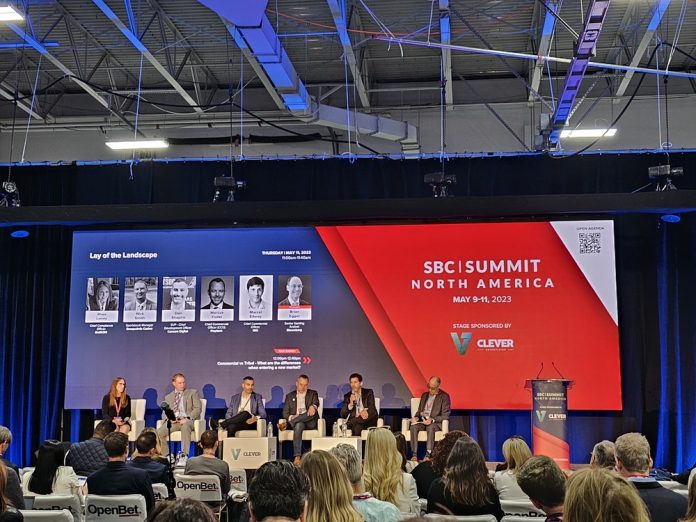As operators continue to search for profitability in the online sports betting and casino industry, there is significant opportunity to be found in cross-selling between the respective products.
Speaking at SBC Summit North America, Dan Shapiro, Chief Development Officer of Caesars said that – as an omnichannel operator – the firm aims to use its rewards program to entice customers to use both land-based and online channels.
Caesars Rewards has over 65 million US users and, according to Shapiro, this helps to “entangle” users in its omnichannel ecosystem.
He explained: “Our strategy is to entangle these customers in our network through our rewards program, and then cross-sell them to different verticals. We know that the most valuable customers are those that are involved in different verticals in our business.
“As customers are playing online, perhaps they’re going to the casino as well, perhaps they’re using the rewards points to redeem an entertainment experience, such as a visit at Caesar’s Palace or something like that, or to one of our celebrity chefs.”
Shapiro was joined on the “Lay of the Landscape” panel by Nick Smith, Sportsbook Manager at Snoqualmie Casino, Rhea Loney, Chief Compliance Officer at BetMGM, Marcus Yoder, CCO at Playtech, and Marcel Elfersy, CCO at GiG.
Elfersy chimed into the conversation, noting that customer loyalty is built from experience rather than whether a casino/online casino offers unique games.
Explaining that players want to show loyalty to games, he outlined that operators must think about profits rather than spending big on unique releases.
Elfersy told the audience at the Meadowlands Exposition Center: “There’s been a lot of talk of the town amongst operators over the last couple of years about developing unique games. I don’t think land-based properties have traditionally had unique games in their facilities.
“Often players actually want to have more loyalty to a game, they want to see the same games across different properties and different brands. So when developing unique content, you need to challenge it with a P&L question as well.”
The conversation soon turned to regulation and compliance, where the panelists evaluated the regulatory outlook of the online casino and sports betting ecosystem in the US.
Loney recounted the process of gaining licensure in different states, recalling some of the challenges that compliance teams face to enter new markets.
She outlined that it is essential for large operators to enter new markets fast, so there is little room for error.
Loney said: “Launching isn’t easy. The compliance playbook isn’t easy, every state changes a little bit. You do find efficiencies along the way, your set of internal controls, you know what those are, and they have to change a little bit from state to state. But in every launch that I’ve been a part of in every market, there’s something that is different, and that makes it a little bit more friction as far as the operator to get to the point of launch.
“It’s really important to train your internal teams, it’s really important to ensure that they know the expectations in a new state. In marketing, you have your national responsible gaming hotline, some states may allow that. But then if you’re doing state-specific advertisements, you might have to have a local hotline, that’s all operationally complex to get to and takes a team.”
Whilst sports betting has rolled out across the majority of the nation, with a few large notable exceptions, the industry has yet to roll out online casino in the same way.
There is some optimism, however, that online casino will see further legalization in the next few years, with another panel providing a hopeful tone following a disappointing 2023.
Playtech’s Yoder noted that online casino is essential for the bottom line of operators, something that other panels at the conference dived into. However, aside from the benefits for operators, Yoder explained that online casino expansion is essential to keep players safe, offering a safe and regulated alternative to black market threats.
“There’s no question that icasino is the more profitable business. That’s true for the operators, that’s true for us, it’s true for the state as well,” Yoder remarked. “I’m very much a legalize and tax kind of person. I’m also in favor of the American Gaming Association board meeting, where we had six regulators up on the stage that basically committed to enforcing their rights in their jurisdiction and their purpose, which is to block out black market casinos.
“So part of getting to profitability is making it so that it is not okay for a US citizen in whatever state that has legalized sports betting to go to a black market site and wager.”















